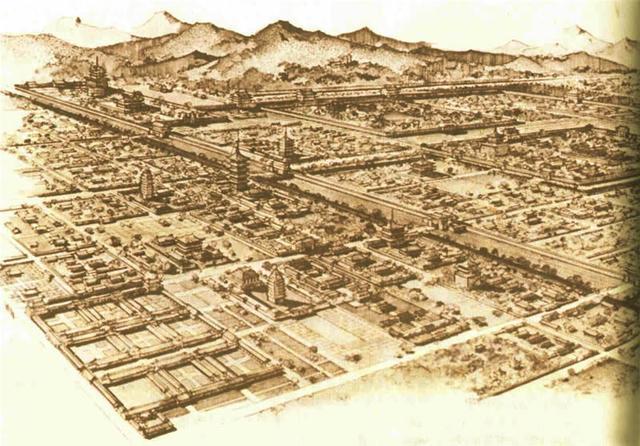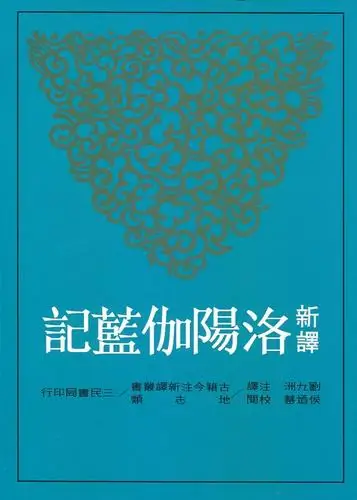The only book in Chinese history describing urban temples
Overview
Chinese Name: 洛阳伽蓝记
English Name: Luo Yang Qie Lan Ji, Luo Yang Kalan Ji
Other Name: Qie Lan Ji/Kalan Ji 伽蓝记
Author: Yang Xuanzhi 杨衒之
Originally Published: 547 A.D
Genre: History, Religion, Geography
Brief Introduction of the Luo Yang Qie Lan Ji
Luo Yang Qie Lan Ji洛阳伽蓝记, abbreviated as Qie Lan Ji, is a historical book of ancient Chinese Buddhism. It was written by Yang Xuanzhi杨衒之 who revisited Luoyang, recalled the prosperity of Buddhist temples in the suburbs of Luoyang and outlined the historical changes. This is a history and character story note integrating history, geography, Buddhism and literature. It was written in 547 A.D .

The Buddhist temples(Qie Lan伽蓝) in Luoyang City in the Northern Wei Dynasty are described in five volumes: inside the city城内, east of the city城东, west of the city城西, south of the city城南 and north of the city城北. The origin and changes of the temple, the organizational scale of the temple and the related celebrity anecdotes are recorded in detail.
It expresses its skillful artistic skills with refined and clean language and complex and simple narrative writing.

In the description of the shape and scale of many Buddhist temples and the outline of the rise and fall of Buddhist temples from beginning to end, it reflects the broad political and economic background and social customs, such as the luxury and greed of royal kings, the exchanges between the northern and Southern Dynasties, the prosperity of handicraft and commerce in Luoyang during the heyday of the Northern Wei Dynasty, the excellent skills and performance of folk artists, etc.
Buddhist temple is not only a symbol of the prosperity of Buddhism in the Northern Wei Dynasty, but also a symbol of the national destiny of the Northern Wei Dynasty. The author, who has experienced great historical changes, is determined to let the voice of the evangelical bell be heard in the words of future generations on the occasion of “Revisiting Luoyang”, and the lines reveal the sadness of an separated world, which constitutes the emotional theme of the whole book.
Luo Yang Qie Lan Ji has long been translated into Japanese, Korean, English and other languages, and has a certain position in the field of International Sinology.
Author of Luo Yang Qie Lan Ji
Yang Xuanzhi杨衒之/杨炫之, whose birth and death years are unknown, was born in Tianjin. He once worked as an official in Luoyang. In 547 ad, he came to Luoyang again because of business trip. Feeling the fragility of Luoyang after the war, he wrote the Luo Yang Qie Lan Ji.

The rulers of the Northern Wei Dynasty needed Buddhism as a ruling tool. After the capital was moved to Luoyang, Buddhist temples were overhauled, and the number of temples nationwide increased to more than 30000, with more than 2 million monks and nuns. Later, due to years of war, the city of Luoyang collapsed and the temple was destroyed.

Excerpts from Luo Yang Qie Lan Ji
后魏自太和迁都之后,国家殷富,库藏盈溢,钱绢露积于廊庑间,不可校数。太后赐百姓负绢,任意自量,朝臣莫不称力而去。唯章武王融与陈留侯李崇负绢过任,蹶倒伤踝。太后即不与之,令其空出。时人笑焉。侍中崔光止取两匹。太后问曰:“侍中何少?”对曰:“臣有两手,唯堪两匹,所获多矣。”朝贵服其清廉。
Since the Northern Wei Dynasty in the northern and Southern Dynasties moved its capital from Pingcheng to Luoyang during the reign of Taihe, the country was so rich that even the corridors and corridors of the National Treasury were filled with uncovered coins and silk, making it difficult to count. One day, the Empress Dowager had a whim. Why not reward all officials with excess silk? It is not only a reward for their work, but also reduce the pressure on inventory. The condition is that you can only take what you can and do what you can. Under the supervision of the empress dowager, most officials carried back silk with their own strength. Only monk yuan Rong, king of Zhang Wu, ordered Li Chong to fall and hurt his ankle because he carried too much. The Empress Dowager found that they violated the rules and ordered them to go back empty handed, which became a joke for everyone. At that time, Cui Guang, a servant, was also present, but he only took two silk. The Empress Dowager asked, “waiter, why do you only take so much?” Cui Guang replied, “the minister has only two hands, so he can only take two, but there are enough.” all the people in the imperial court are convinced of his integrity.








